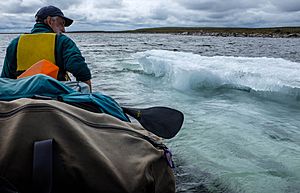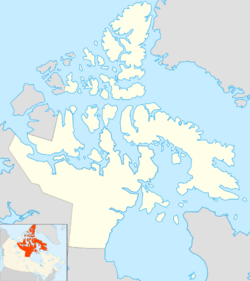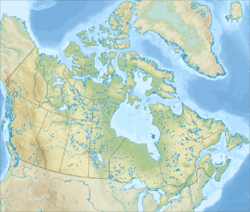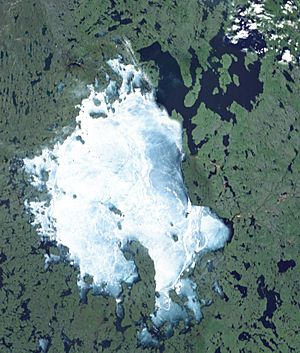Dubawnt Lake facts for kids
Quick facts for kids Dubawnt Lake |
|
|---|---|

Dubawnt Lake, late July 2015
|
|
| Location | Kivalliq Region, Nunavut |
| Coordinates | 63°4′0″N 101°42′0″W / 63.06667°N 101.70000°W |
| Lake type | Glacial |
| Primary inflows | Dubawnt River |
| Primary outflows | Dubawnt River |
| Basin countries | Canada |
| Surface area | 3,833 km2 (1,480 sq mi) |
| Surface elevation | 236 m (774 ft) |
| Islands | Snow Island |
| Settlements | uninhabited |
Dubawnt Lake is a large lake located in the Kivalliq Region of Nunavut, Canada. It covers an area of about 3,630 square kilometers (1,400 sq mi) and has many islands. This lake is found far north in Canada. It is about 320 kilometers (200 mi) north of where the provinces of Manitoba and Saskatchewan meet Nunavut. It is also about 480 kilometers (300 mi) west of Hudson Bay. The Arctic Circle is about 400 kilometers (250 mi) to its north.
The main river flowing into and out of Dubawnt Lake is the Dubawnt River. This river flows north and eventually joins the Thelon River at Beverly Lake. The Thelon River then flows east all the way to Hudson Bay. The area around Dubawnt Lake has been important for different Indigenous groups. These include the Sayisi Dene people and the Harvaqtuurmiut and Ihalmiut groups of Caribou Inuit.
The first European to record seeing the lake was Samuel Hearne in 1770. However, most outsiders did not know much about it until Joseph Tyrrell explored it in 1893. There are no towns or cities permanently located on the lake. But, there are special camps where people can fly in to fish. You can catch large lake trout there during the two months when the lake is not frozen.
Dubawnt River: A Northern Waterway
The Dubawnt River is a long river, stretching about 874 kilometers (543 mi). It starts in the Northwest Territories. Its waters begin from a small stream that flows into Wholdaia Lake. This starting point is northwest of where Manitoba, Saskatchewan, and Nunavut meet.
There is a special path, called a portage, that connects Flett Lake (which feeds Wholdaia Lake) to Selwyn Lake. Selwyn Lake then drains southwest towards Lake Athabasca. In 1893, explorer Joseph Tyrrell traveled by canoe. He went from Lake Athabasca down the Dubawnt River all the way to Chesterfield Inlet. Along the Dubawnt River, you will find several lakes. These include Wholdaia, Barlow, Cary, Markham, Nicholson, Dubawnt, Grant, Wharton, and Beverly. East of the Dubawnt, another river called the Kazan River also flows north to join the Thelon River.
Wildlife Around Dubawnt Lake
Dubawnt Lake is a home for many different animals. You can find animals like foxes and wolves living in this area. Many types of birds of prey also make their homes around the lake. These birds are hunters, like eagles and hawks.
See also
 In Spanish: Lago Dubawnt para niños
In Spanish: Lago Dubawnt para niños
 | Jessica Watkins |
 | Robert Henry Lawrence Jr. |
 | Mae Jemison |
 | Sian Proctor |
 | Guion Bluford |




